Baltimore

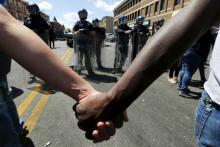
Douglas, author of the new book Stand Your Ground: Black Bodies and the Justice of God, writes about the death of Florida teen Trayvon Martin, the acquittal of George Zimmerman in his killing, and the deaths of other unarmed black people that followed.
Douglas talked about violence faced by African-Americans and the black church’s response. The interview was edited for length and clarity.

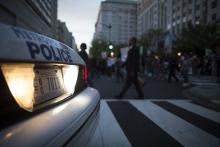
On Monday night as I read and watched the unfolding news coverage of riots, my Facebook newsfeed bombarding me with posts both from activists and from folks who hated the rioting but didn't care about Freddie Gray, I thought about saying a prayer for peace.
I started to pray, but God interrupted me, in the words of the prophet Jeremiah:
"They have treated the wound of my people carelessly,
saying 'Peace, peace,' when there is no peace.
They acted shamefully. They committed abomination.
Yet they were not ashamed."
Was I the “they?”
Who are God's people here?
In an unexpected announcement Friday, Baltimore lead prosecutor Marilyn J. Mosby said there is “probable cause” to file criminal charges against police officers in the death of Freddie Gray, who suffered a spinal cord injury while in police custody on April 12.

I love Martin Luther King. I wrote my master’s thesis on his approach to nonviolence. King is the greatest prophet in the history of the United States. And white people should know him better.
Blitzer, like so many white people, doesn’t know Martin Luther King. He misses King’s point. If white people want to reference King, we need to stop using him to condemn black violence. We need to stop pitting a black man against black people. It’s patronizing. It’s demeaning. And it misses the point.

Ultimately, Jesus shows us that our wounds do more than mark us — they connect us. Jesus knows that through the touching of his wounds, Thomas will be forever connected to him, doubts and all. Jesus knows that we must let our scars speak. In this beautiful, intimate encounter with Thomas, Jesus teaches us to let our wounds show and be touched so we too can know peace. Peace cannot come to us until we have the courage to proudly bare our scars and connect with one another through our wounds. Until then, we, like Thomas, will be left standing in our doubts and anxieties.
I will not pretend to fully understand the complex circumstances surrounding the death of Freddie Gray and the riots in Baltimore. But I have to wonder what would happen if we followed Jesus’ instructions to Thomas. What if instead of ignoring bystanders’ cries for Freddie Gray to receive medical treatment, the police had reached out their hands and held an inhaler for Freddie Gray? What if all the people of Baltimore had put their hands on Freddie Gray’s injured spine? What if the police force in Baltimore had reached out for the wounds of grief deeply gnawing within the rioting crowds? What if the crowds had placed their hands into the wounds of the injured police officers?
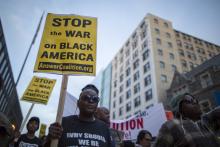
Hundreds gathered at Gallery Place Metro in Washington, D.C., on Wednesday night in solidarity with Baltimore activists to protest the death of Freddie Gray. The crowd marched for two hours across the city until reaching their final destination at the White House.
Leaders from multiple activist groups were helping lead the crowd, including Eugene Puryear, a candidate for the At-Large seat in the D.C. Council. The crowd began the march with chants of, "All night, all day, we're going to fight for Freddie Gray!" More solidarity events have been planned by the event organizers in the upcoming days.
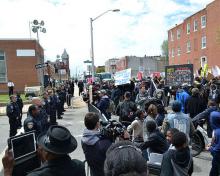
Perhaps we are here again because we do not really listen. We gaze at each other’s pain and lament, but we don’t really see in a way that will shift our vision, clarify our perspective. We hear each other’s stories but don’t really listen in a way that will change us in a profound way, lead us to question our deepest held assumptions. We post a hashtag but don’t embody these digital signatures in our everyday lives?

I walked through ash and glass as neighbors and community members swept up the remnants of our neighborhood. The night before, flames touched sky in all corners of our city as news and police helicopters hovered overhead. The city was Los Angeles. The year was 1992, and it was the third day after the police who beat Rodney King were acquitted by an overwhelmingly white jury in Simi Valley.
That was the day I was introduced to the words of Jeremiah 29:7: “But seek the peace of the city where I have sent you into exile, and pray to the Lord on its behalf, for in its peace you will find your peace.”
On Monday, Maryland Gov. Larry Hogan called in the National Guard and Baltimore Mayor Stephanie Rawlings-Blake declared a citywide curfew to quell violence that erupted in Monument City following the funeral of 25-year-old Freddie Gray. Gray died a week after sustaining a nearly severed spinal cord after being detained by police on April 12. The reason for the stop? Gray ran after making eye contact with police. An investigation is ongoing — while the people of Baltimore and beyond demand justice.
The images of fires rising over the Baltimore landscape were eerie, as it was only a few months ago that the nation sat glued to television sets watching the small town of Ferguson, Mo., erupt. And I fear we are becoming numb to it. We turn the TV on to watch our favorite reality show. We see chanting, running black people, and we think: again? Then we turn back to The Voice.

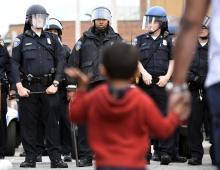
I enjoy cop shows on television.
My favorite is Blue Bloods, following the “Reagan” family from terrorist threats to homicides to domestic violence.
I can’t imagine what it’s like to be a cop. Perhaps routine marked by bursts of frenzy, some of it life-threatening. One’s hometown seen through the lens of crime, tragedy, and evil. Low pay, high risk.
I like Blue Bloods because it shows upright law enforcement taking “Protect and Serve” seriously and making brave and ethical choices.
These shows are quite unrealistic, of course. Crime doesn’t get solved that easily or snap decisions made that wisely.
I don’t think, however, that I realized until recently how separated from reality those fictional accounts have been. As police shootings of unarmed citizens go viral, as minorities talk of long-standing police brutality, as we watch guards beating prisoners, and as federal law enforcement engages in creepy surveillance, internal corruption, and the arming of local police as military commandos, the veil is lifted.
Now we see in our own American law enforcement the same brutality and power-madness that have marked corrupt societies we supposedly surpassed, from the secret police in Eastern Europe to uniformed thugs in South America.
I find it confusing. Not the discovery that TV isn’t real, but to see how low we have fallen. Has this brutality been the dark side of police work all along?
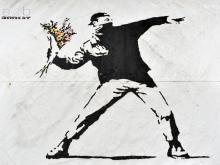
Recent protests in Baltimore are raising the question of (non)violence anew. Should violent protesters be criticized? Should Christians call for nonviolence?
Some bluster “Of course!” while others say that’s not the point.
Over at The Atlantic, Ta-Nehisi Coates, who grew up in Baltimore, is challenging calls for nonviolence in an article entitled “Nonviolence as Compliance.” Calling “well-intended pleas” for nonviolence “the right answer to the wrong question,” Coates writes:
When nonviolence is preached as an attempt to evade the repercussions of political brutality, it betrays itself. When nonviolence begins halfway through the war with the aggressor calling time out, it exposes itself as a ruse. When nonviolence is preached by the representatives of the state, while the state doles out heaps of violence to its citizens, it reveals itself to be a con. And none of this can mean that rioting or violence is "correct" or "wise," any more than a forest fire can be "correct" or "wise."
The line bears repeating: “When nonviolence begins halfway through the war with the aggressor calling time out, it exposes itself as a ruse.” Are newly scared white folks simply “calling timeout?”
Coates wants to ground our conversation about violence in the narrative of a larger “war.” For him, violence did not “break out” last night – violence has always been present. Coates wants to shift our focus from the shorter story of rock-throwers to the much longer story of the black experience in the United States.
As the clergy marching in Baltimore put it, “There’s been a state of emergency way before tonight.”

As thousands took to the streets in Baltimore on Monday night to protest the death of Freddie Gray on th eday of his funeral, nearly 100 clergy joined the protesters.
Freddie Gray, a 25-year-old black male, died April 19 while in police custody, one week after his arrest. Although one of the officers reported Gray “was arrested without force or incident,” Gray died of severe spinal injury, prompting citizens to question how Gray was treated in custody.

The United Methodist Church’s highest court gathers for its semiannual meeting in Baltimore on Wednesday, as the denomination confronts a growing movement of defiant clergy members opposed to church doctrine on gays and unwilling to back down.
“Martin Luther King said there are risks when you stand up to unjust laws,” said Ogletree, 80, an ordained elder in the New York Conference of the United Methodist Church.
The Book of Discipline, the denomination’s collection of law and doctrine, forbids the ordination of “avowed” homosexuals and bans clergy from officiating at same-sex marriages or holding such ceremonies in its churches.
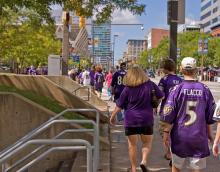
One of my favorite views of Charm City right now is entering into the downtown area from the 395 off-ramp. Our city is painted with Ravens spirit — purple lights dancing on skyscrapers, "Go Ravens!" posters taped to city windows, and my favorite: the billboard that simply said "WOW" after the Ravens' win Sunday over the Patriots. In fact, as I sit down to write this at the Towson Public Library, a woman just pointed out that the bookshelf next to me contains an entire collection of books with purple covers, complete with a border of purple stars cut out of construction paper.
Purple has become a unifying topic, bringing complete strangers together in conversation. All week at work, I've asked patients, "Did you see the game?" or I'd see someone wearing a purple scarf and fist bump in the air an amiable, "Go Ravens!" I think this is one of the beautiful things about sports: its ability to bring people together irrespective of socioeconomic status, race or political beliefs.
But I can't help but notice something else about all this celebration — something that disturbs me.
BALTIMORE — A divided Catholic hierarchy on Tuesday failed to agree on a statement about the economy after a debate that revealed sharp differences over the kind of social justice issues that were once a hallmark of the bishops’ public profile.
The defeat of the document, titled “The Hope of the Gospel in Difficult Economic Times,” followed an hour of unusually intense debate among the 230 bishops gathered here for their annual meeting. It left many of them openly frustrated that the prelates have not made a joint statement about the nation’s economic woes four years after the recession hit.
“This document is dead,” New York Cardinal Timothy Dolan, president of the U.S. Conference of Catholic Bishops, said with obvious disappointment as he brought the gavel down on the debate after it failed to secure the two-thirds majority needed for passage.
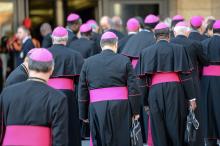
As the bishops gather in Baltimore this week for their annual meeting, they like everyone else in the country will be talking about last week’s election. The U.S. Catholic bishops took a beating at the polls. Not only was President Obama reelected, despite their attacks on him, the bishops also lost on state referendums on same-sex marriage.
Like all Americans, the bishops have a constitutional right to participate in the political process. They can debate the issues, criticize candidates and publicly express their views. They can even endorse candidates as long as they don’t do it on church property and don’t use church funds in supporting a candidate or party. In fact, they can even run for president as did Rev. Pat Robertson and Rev. Jesse Jackson. The U.S. Constitution does not forbid this; Roman Catholic canon law forbids it.
But what is constitutional is not always effective or prudent. Clearly the political strategy of the bishops is not working. A majority of Catholics voted for Obama and gay activists won every referendum. The Missouri and Indiana Republican senatorial candidates, who took the toughest positions on abortion, were also defeated when the Republicans were expected to win these races.
So where do the bishops go from here?
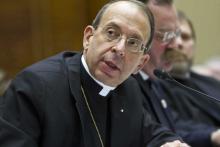
(+Video may contain coarse language+)
Indie music darling, Jeff Mangum, who rarely plays in public, surprised #OccupyWallStreet protesters in New York City earlier this week with an impromptu concert. A New Jersey singer-songwriter pens two songs for revolutions. And an order of Catholic nuns offer free mp3 downloads of a protest song inspired by the life of St. Francis of Assisi.